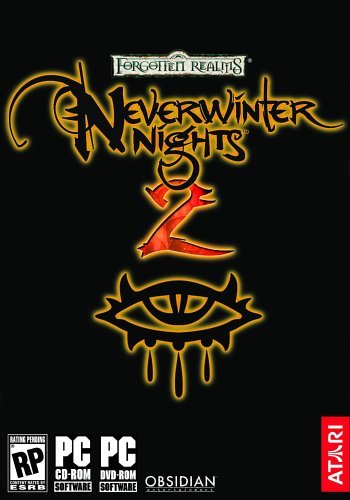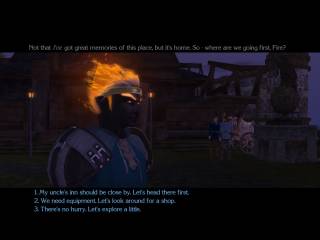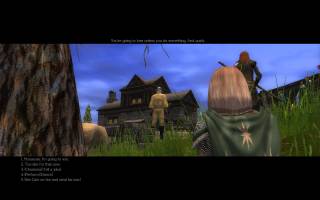I play sort of old games (Neverwinter Nights 2)
By ArbitraryWater 3 Comments
It’s been… like a month? Good news: I’m done with school for at least another semester. Bad News: I still don’t have a job lined up for this downtime. I could really use a job. Hopefully one of the applications I’ve filled out will go through, but if not… that means even more time for stupid video games than I anticipated, which is probably a bad thing since I’d like a social life and sitting alone on a computer for several hours a day is a great way of convincing oneself that getting into Pathfinder is a good and not terrible idea (though I guess I’d have a social life of some sort if I did that, albeit a twisted dark reflection of one). Regardless, when I wasn’t studying for my one final of note, I played some vidja games. I beat Baldur’s Gate and imported my character into BG2, so that will eventually be a blog, but before that happens I’ll tell you about a different, not-seminal D&D game: Neverwinter Nights 2.

I should preface this by saying this blog is only about the Original Campaign for NWN2. I haven’t started Mask of the Betrayer yet and everything on the internet seems to point towards it being Obsidian doing the things that it does best and that this base campaign is only decent by comparison. On its own merits, the original campaign for NWN2 is an enjoyable, straightforward D&D adventure that isn’t especially difficult or subtle. Oh, it’s still leagues better than what I played of the original campaign of Neverwinter Nights the first, perhaps the most boring and generic Bioware single-player ever made, though I feel like it’s common knowledge that the best things about that game were the abundance of fan-modules and the multiplayer (also: Hordes of the Underdark, apparently).
Is it as good as anything on the Infinity Engine? Probably not, though it is the most expansive incarnation of D&D 3rd edition in video games*. This is an advantage that cannot be overlooked, since it’s the only game to use 3.5 and contain both Subraces and Prestige Classes. That means you can have your chaotic good Drow Ranger multiclass to a wizard and maybe take a few levels of Arcane Archer while you’re at it. When compared to the last 3rd edition game I wrote about, it’s a definite step up from Icewind Dale II’s incredibly limited selection of feats and skills.

But I really should get on to the game itself. You start from humble origins, darkness comes in search of plot mcguffins and eventually you find out the that an ancient evil has awakened and only you can stop it. Along the way you pick up a cast of colorful characters with their own distinct personalities and you solve their personal problems in addition to the problem threatening the entire Sword Coast. Obviously I’m simplifying it a bit, but it still stands that the story of Neverwinter Nights 2 is something of a roller-coaster, in that even though one can see most of the twists ahead, the ride itself is still enjoyable. This is in part to the game being made by Obsidian, a developer capable of quality writing and characterization even when forced into recognizable archetypes.

Indeed, the supporting cast of NWN 2 is quite strong, mostly because they all kind of hate each other. Even getting past the axiomatically opposed pairings of Qara and Sand, Casavir and Bishop, Ammon Jerro and Zhjaeve, there’s a general sense that pretty much everyone in your party would murder the others in their sleep if not for your presence and that’s something I like in RPGs (incidentally, Dragon Age II is another great example of this trope). Your party members themselves are a bit inconsistent in how they’re fleshed out. Some, like Khelgar, have entire subquests devoted to them while others, like Grobnar, get at most a few influence checks. I imagine this stems from a KotOR 2-esqe amount of cut content, and while this game actually has an ending it’s not hard to see where stuff could be missing (also the ending is deliberately vague, but I imagine that gets addressed in Mask of the Betrayer). Also the influence system is dumb and it seems like some dialogue options are clearly not available without a very specific guide or cheating.

The combat is… not demanding. That’s not to say that you can close your eyes and expect the game to do everything for you (due in part to the rather… challenged AI scripting), but on the Core Rules difficulty (which makes fireballs have friendly fire) you can get by without a ton of pausing and micromanaging like you would in an infinity engine game, partially due to the scads upon scads of buffs you can cast on your party members to make them kill things more effectively and partially due to the way death is handled. Being knocked down to zero hp only knocks party members unconscious, thus you can get away with playing sloppy since there’s no penalty for resting either. Despite that, there are a few solo sequences I would imagine would be hard if you made your character a Deep Gnome wizard, or whatever. I guess I’ll have to see if Storm of Zehir delivers on being that tactical party-based iteration of NWN that it claims to be, so we’ll see how that one goes when I get to that point.
The actual dungeoneering is decent, though you’ll have more than enough money by the end of the game to both fully upgrade your stronghold and buy whatever absurdly expensive items you fancy, though the crafting and enchanting systems are powerful enough that you could just make whatever powerful items you preferred (though it bears mention that the crafting system is just awkward and cumbersome enough that it may be motivation for the player to stick with the premade stuff instead of say… a +5 flaming Bastard Sword made of Cold Iron.) Also, having played enough Baldur’s Gate and Baldur’s Gate 2 to remember how open those games are, NWN 2 is pretty linear. You always know what you’re supposed to be doing and the only difference that is made is in what order you do them. There are also a few sidequests here and there, but not a whole ton in general. Kind of a bummer on that front though I imagine that makes for pretty decent multiplayer, actually.
It also bears mentioning that Neverwinter Nights 2 is not a very pretty game. While some of the spell effects are nice, the character models are not. Just the hair selection alone is reason enough to either make your character bald or constantly wearing a hat of some sort. The soundtrack is good, though it’s not quite Jeremy Soule (who did the soundtrack for the first game, funnily enough) and the voice actors deliver their lines well. All in all, what one would expect from Obsidian. Speaking of what one would expect from Obsidian, the game randomly crashed a few times and failed to give me a bonus feat granted by my class (favored souls are supposed to get proficiency in their deity’s favored weapon), which meant I had to add it in with the console instead. All in all, I enjoyed my time with this game quite a bit, but what I’m really interested in is Mask of the Betrayer, the game everyone calls “A really good RPG”. So you can expect that in a time-frame. Until then: don’t die, eat your vegetables and keep on playing games that came out like 6 years ago.
